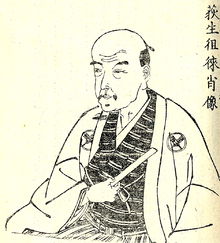Ogyu Sorai
Ogyū Sorai ( Japanese 荻 生 徂 徠 ; * March 21, 1666 in Edo ; † February 28, 1728 ibid) was a Japanese neo-Confucian scholar, philosopher and economic theorist.
Sorai studied Chinese language and culture in his youth and, as a follower of neoconfucianism in the form of Zhu Xi, critically dealt with Itō Jinsai before joining the school of Kogaku ("school of ancient learning"). His philosophical views, which he expressed in the writings Bendō ("Determination of the way ( Dō )") and Benmei ("Determination of terms"), he set in the writings Taiheisaku ("Politics for the Great Peace") and Seidan ("Discourses about the government ”) into political-ethical principles. His most important students were Hattori Nankaku and Dazai Shundai .
Standing politically on the side of the Tokugawa shogunate , Ogyū rejected the imperial court's claims to power as well as contemporary Shintoism as an invention of Yoshida Kanetomo . He was the theoretical head behind the Kyōhō reform of the shogun Tokugawa Yoshimune .
literature
- John A. Tucker (transl. And ed.): Ogyū Sorai's philosophical masterworks: the Bendō and Benmei , annotated edition University of Hawaii Press, 2006, ISBN 9780824829513
Web links
- Ogyū Sorai at Encyclopedia.com
- Ogyū Sorai in the Encyclopædia Britannica
| personal data | |
|---|---|
| SURNAME | Ogyu, Sorai |
| ALTERNATIVE NAMES | 荻 生 徂 徠 (Japanese) |
| BRIEF DESCRIPTION | Japanese neo-Confucian philosopher |
| DATE OF BIRTH | March 21, 1666 |
| PLACE OF BIRTH | Tokyo |
| DATE OF DEATH | February 28, 1728 |
| Place of death | Tokyo |
